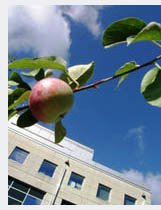
Would Rajagiri think of Newton's heritage or....
The apple of York’s eye - When York students want to come up with groundbreaking scientific discoveries, they can now go to Newton 's apple trees, reported the Toronto Star Oct. 20. That's possible because five years ago, University biologists managed to plant three tiny trees, which had been grafted with cuttings from the Newton original, in a quadrangle on the Keele Street campus. One of those trees recently sprouted an apple for the first time. Biologist Michael Boyer, professor emeritus in York 's Faculty of Science & Engineering, said York 's fledgling trees, the first to flourish in Canada other than in research settings, take their place among other descendants of Newton 's famed tree in the United States , including at the Nebraska Statewide Arboretum, and in England . "We hope this might act as a stimulus [to discovery]," Boyer said, noting it took York almost a decade to acquire and successfully plant Newton 's tree. "Sometimes great ideas flow from simple things."
Of course not an apple tree; Rajagiri could think of a mango tree from Nalanda or Taxila or Viswa bharati to invigorate newer insights.....?
For friends in other countries: York University is the leading interdisciplinary research and teaching university in Canada, the third largest in the country. York - an autonomous not- for - profit corporation, is host to a dynamic academic community of 50,000 students and 7,000 faculty and staff, as well as 180,000 alumni worldwide. The Schulich School of Business at York University was ranked number three in the world in a global ranking of the world's top MBA programs after Stanford and ESADE of Spain.
No comments:
Post a Comment